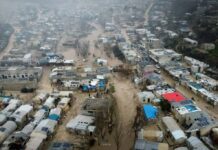
In a recent address to the United Nations Security Council, UN Special Envoy for Syria, Geir Pedersen, expressed serious concerns about the deteriorating situation in Syria. He highlighted the potential for further conflict following the recent hostilities between Israel and Hamas and subsequent airstrikes on Syrian territory.
Pedersen stressed that the regional conflict has already affected Syria, as evidenced by recent exchanges involving the United States, Iran-backed militias, and Israeli airstrikes in Damascus and Aleppo. There have also been reports of rocket attacks from Syria towards the Golan Heights. These incidents are alarming and have the potential to worsen the already volatile situation.
Geir Pedersen emphasized that Syria is currently facing one of its most perilous periods in recent memory. The country is experiencing its worst wave of violence in over three years, leading to widespread human suffering and displacement. The situation in Syria is dire, with both civilians and international aid organizations struggling to cope with the consequences of this violence.
The immediate necessity for de-escalation is paramount, and Pedersen called on all involved parties to exercise restraint and fully adhere to international humanitarian law. Further escalation in Syria will have dire consequences, with civilians bearing the brunt of the suffering. As violence continues to rise, providing humanitarian assistance becomes increasingly challenging.
The address by the UN Special Envoy underscored the importance of international cooperation among all relevant stakeholders. Given the complex web of actors involved in the Syrian conflict, it is essential for countries and organizations to collaborate to prevent a further deterioration of the situation. Prioritizing diplomacy, dialogue, and peaceful conflict resolution over military actions is crucial.
In recent days, Syrian territories have witnessed a series of cross-border engagements that heighten tension in the region. Pro-Iranian militias and Israeli forces engaged in mutual shelling near the Golan Heights, while American forces retaliated with artillery and drone strikes after attacks by Iranian-backed Iraqi militias on U.S. bases in Syria. These incidents illustrate the volatility of the region and the potential for unintended consequences.








